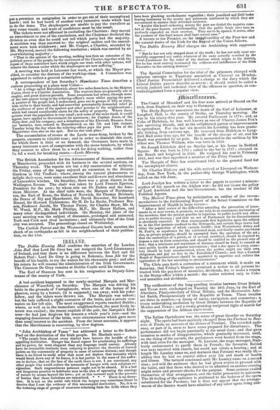IRELAND.
The .Dublin Evening Mail confirms the assertion of the London John Bull that Lord De Grey has not resigned the Lord-Lieutenancy of Ireland, and that there is no difference between the Earl and Sir Robert Peel : Lord De Grey is going to Bohemia, bona fide for the benefit of his health, to.try the waters for his rheumatic gout ; and after his return he will resume the administration of the Irish Government. The Countess De Grey remains at Dublin Castle until his return.
The Earl of Shannon has sent in his resignation as Deputy-Lien- tenant of the county of Cork.
A bad accident happened to the newly-married Marquis and Mar- chioness of Waterford, on Saturday. The Marquis was driving his bride in the grounds of Curraghmore, when one of the horses of his phaeton, stung by a hornet, (it is supposed,) ran away, with his yoke- fellow, and the riders were thrown out. The Marquis was unhurt; but the lady suffered a slight contusion of the brain, and a severe con- tusion on her left side. The most exaggerated reports reached Dublin ; where, as well as in the immediate neighbourhood, the most lively in- terest was excited ; the recent nuptials of the pair, the Marquis's kind- ness—he had just forgiven his tenants a whole year's rent—awl the engaging demeanour of the bride, were circumstances which gave more than usual interest to the accident. From the latest accounts, it appears that the Marchioness is recovering, by slow degrees.
"John Archbishop of Timm" has addressed a letter to Sir Robert Peel on the destitution of the Irish people. Dr. Machale says— "The people from almost every district have become the heralds of their appalling destitution. Hunger has found organs for proclaiming its sufferings and its power, far more eloquent than any language could convey. Already have its irresistible instincts been reducing to practice the theories of learned jurists on the community of property in cases of extreme distress; and though there is no friend to social order that must not deplore that necessity which would break down any of its fences, it is but justice to the mass of the suffer- ers to declare, that on the fate of the earth there is not, I am convinced, any other people who would endure the torments of hunger with such religious re- signation. Such magnanimous patience ought not tube abused. It is a bad and dangerous practice to habituate men to the idea of appeasing the cravings of nature by means beyond the laws ; yet at this moment such is the pressure of famine that those violations are committed. • • • There is no decep- tion. It is not on the awful tale which the tongue may sometimes frame to deceive that I rest the evidence of this unexampled destitution. No, it is on the tottering steps of groups of creatures returning from the fields where they have been plucking unwholesome vegetables ; their jaundiced and livid looks bearing testimony to the scanty and poisonous nutriment by which they are necessitated to sustain their wretched existence.
"Amidst this heart-sickening misery the poor are denied the negative com- fort of the poor-houses, notwithstanding that the public funds have been so profusely expended on their erection. They are to be opened, it seems, after the pressure of this hard season shall have passed over."
A lecture to the Premier, on the inapplicability of the Poor-law and the natural desire of the Irish for the Repeal of the Union follows.
The Dublin Evening Mail charges the Archbishop with suppressio yen— "But he has not only stopped short of the truth ; he has not only most un- candidly suppressed any notice whatever of the sums actually remitted by the Lord-Lieutenant for the relief of the distress which reigns in his district., but be has most untruly insinuated the coldness and indifference of the Irish
Executive to the existing distress." • The Special Commission for the trial of the prisoners charged with agrarian outrages in Tipperary assembled at Clonmel on Monday. Chief Justice Pennefather delivered a charge to the Jury which the Liberal Dublin papers describe as severe : it should rather be called a strictly judicial and technical view of the offences in question, as con- tradistinguished from a popular view.


























 Previous page
Previous page